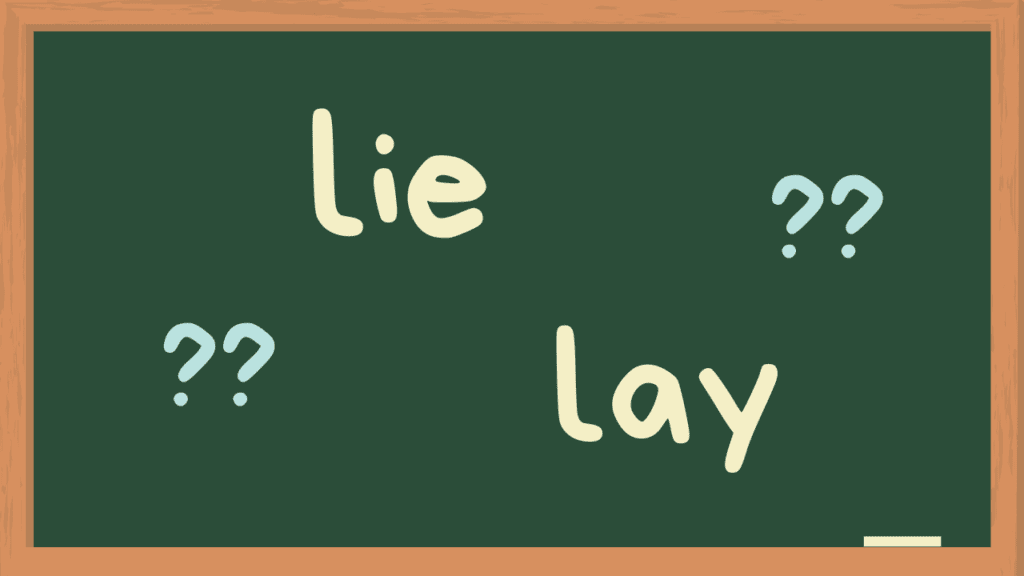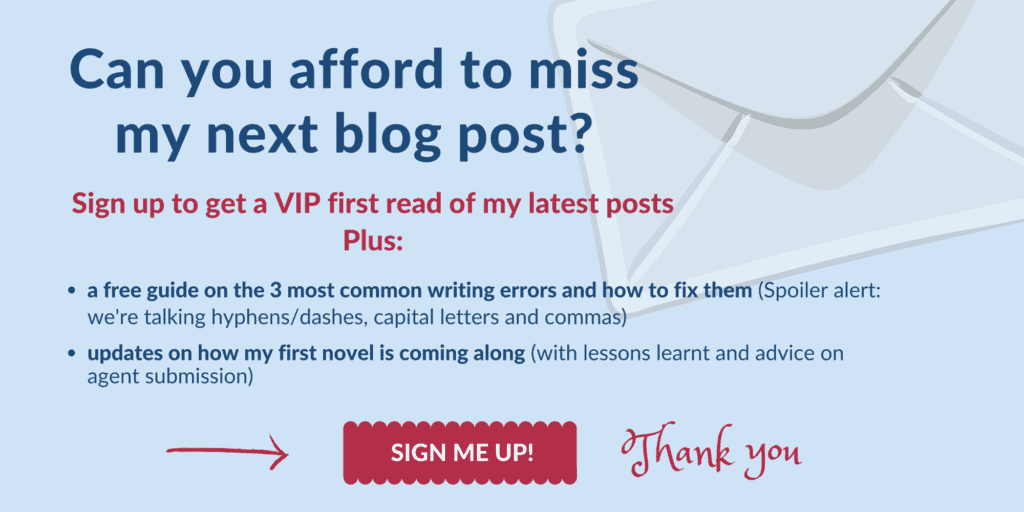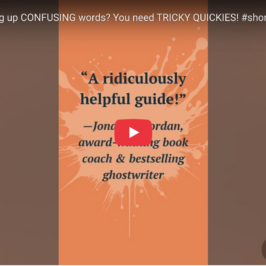
‘Lie’ and ‘lay’ are two of the most confusing words to use in either present or past tense, for native-English speakers and English learners alike. Become a ‘lay/lie’ guru with my guide!
As I always say with these kinds of posts, bookmark this page. You’ll thank yourself later.
Once you’ve read this article and feel enlightened, have a go at the short quiz!
Why the confusion between ‘lie’ and ‘lay’?
The main reason for the confusion, at least for me (yes, I do still have a wobble and have to look it up) is that one of the past forms of ‘to lie’ is ‘lay’. Yup.
Not to mention that there are two different meanings of the verb ‘to lie’. Yup again.
Magic bullet for ‘lay’ or ‘lie’
Ok, so I said ‘magic bullet’ to get your attention. But this may help. Repeat after me:
Yesterday, I lay on the bed while you laid down your head.
Now, I lie on the bed while you lay down your head.
Remember these two phrases while reading on. Then read them again and memorise them, so you can pluck them out of your memory bank whenever you need them.
Magic bullet for 'lay' or 'lie'. Repeat after me: "Yesterday, I lay on the bed while you laid down your head. Now, I lie on the bed while you lay down your head." Share on XTo lie
Let’s firstly look at the two meanings of this verb:
- To tell an untruth:
- Would I lie to you?
- I always lie when I’m nervous.
- To be in a horizontal position:
- She lies on the floor when it’s hot.
- They lie down whether they are tired or not.
In the present tense, the verb is spelt the same way, regardless of whether you’re talking about an untruth or lying down, as in the examples above.
However, if someone told an untruth in the past, or put themselves in a horizontal position in the past, things start to get interesting:
- To tell an untruth:
- I lied to you.
- They lied when they were nervous.
- To put oneself (not something or someone else) into a horizontal position:
- Last week, she lay [herself] on the floor because it was a hot day.
- Yesterday, they lay [themselves] down as they were tired.
Notice anything screwy? The past tense of ‘to lie’ as in ‘to lie oneself down’ is ‘lay’. Too weird.
Notice anything screwy? The past tense of 'to lie' as in 'to lie oneself down' is 'lay'. Too weird. Share on XLearn the examples above, then take a look at one final point about ‘to lie’.
If you want to say that you had put yourself into a horizontal position before something else happened (the fancy term for this is the pluperfect tense), or you have put yourself in a horizontal position, you need to use the form lain’ (otherwise known as the past participle).
For example:
- We have lain awake for two hours because of the storm.
- Before you rescued me, I had lain there for a day.
And, just for the sake of completeness, the past participle of ‘to lie’, as in ‘to tell an untruth’ is the nice, regular form ‘lied’:
- I have lied to my brother since we were young.
Got it? Yes? Great, read on. No? Read it again.
To lay
Now that we (more-or-less) understand how to use ‘to lie’, let’s look at ‘to lay’.
As we’ve seen, ‘to lie’ means to put oneself into a horizontal position (or to tell an untruth). ‘To lay’ is about doing something to another person or thing. Read that again. Once you understand this distinction, things become a lot easier.
'To lie (down)' means to put ONESELF into a horizontal position; 'to lay' is about putting down SOMETHING/SOMEONE ELSE. Once you get this distinction, things become a lot easier. Share on XPresent tense for ‘to lay’ [something]:
- I always lay the table every day.
- You lay the quilt on the bed.
- The chicken lays an egg.
Past tense for ‘to lay’ [something]:
- I laid the table yesterday.
- He laid the quilt on the bed last week.
- The chicken laid an egg a day last summer.
The past participle (used with ‘have’ or ‘had’) for ‘to lay’ [something] is the same as the past tense – ‘laid’. Easy!
- I had already laid the table by the time they arrived.
- Have you laid an egg, Chicken Licken?
Is ‘layed’ a word?
No.
Question: Is 'layed' a word? Answer: No Share on X‘Lay of the land’ or ‘lie of the land’?
I have grown up with the phrase “the lie of the land”, but now and again I come across “the lay of the land”. Maybe your experience is vice versa.
There’s a simple explanation.
In British English (I’m from the UK), the expression is “the lie of the land“. In American English, it’s “the lay of the land“.
Do as I say, not as they sing
You’ll see plenty of song titles and lyrics where the use of ‘lay’ and ‘lie’ is grammatically incorrect. Even the greats get it wrong, intentionally or otherwise.
We’ll let them wave their artistic licence. Sometimes the wrong way just sounds more right.
For example:
- ‘Lay Lady Lay’ by Bob Dylan (The grammatically correct ‘Lie Lady Lie’ just wouldn’t have the same ring. Do your thing, Bob.)
- ‘Lay Down’ by Touch Sensitive
- ‘Lay Down Sally’ by Eric Clapton (There’s also a comma missing after ‘down’, unless he’s instructing someone else to lay down Sally, in which case ‘lay’ is right. Geek out!)
- ‘Lay Back in the Arms of Someone’ by Smokie
But plenty get it right!
- ‘Lie Down’ by Whitesnake
- ‘Lay Me Down’ by Sam Smith
- ‘Lie Down’ by Doja Cat
- ‘Lay It Down’ by Lloyd
- ‘Wherever I Lay My Hat’ by Paul Young (Listen out for the sneeze in the first verse at 1:12.)
‘Lie’ or ‘lay’ – in summary
‘To lie’
- I lie [myself] down. (Present)
- I lie to protect myself. (Present)
- I lay [myself] down last night. (Past)
- I lied to the teacher yesterday. (Past)
- I have lain [myself] down every day for two years. (Past participle)
- I have lied to the teacher on a regular basis. (Past participle)
‘To lay’
- I always lay it down carefully. (Present)
- I laid the table yesterday. (Past)
- I have laid an egg. (Past participle)
If you’re a writer, a professional editor/proofreader will pick up on any ‘lie’/’lay’ errors in your text. Don’t skip this stage of publication. A book riddled with typos and errors will attract bad reviews and greatly affect your sales.
Quiz – ‘lie’ or ‘lay’?
Test your knowledge with this five-question quiz!










Leave a Reply